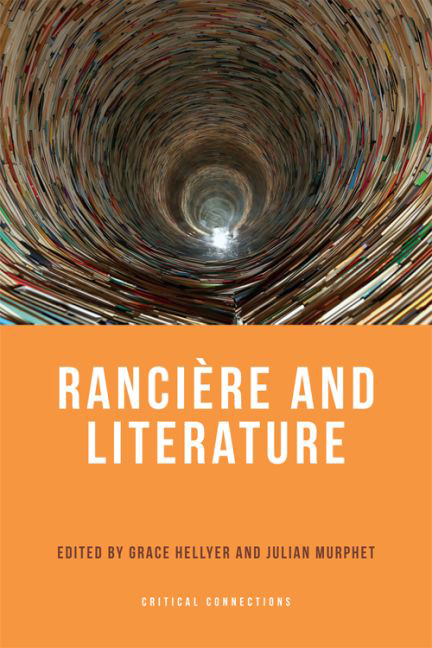Book contents
- Frontmatter
- Contents
- Acknowledgements
- Notes on Contributors
- Introduction: Rancière and Literature
- SECTION I Coordinates
- 1 Fictions of Time
- 2 Jacques Rancière in the Forest of Signs: Indiscipline, Figurality and Translation
- 3 Rancière and Tragedy
- 4 Rancière Lost: On John Milton and Aesthetics
- 5 ‘A New Mode of the Existence of Truth’: Rancière and the Beginnings of Modernity 1780–1830
- SECTION II Realisms
- SECTION III Contemporaneities
- Index
5 - ‘A New Mode of the Existence of Truth’: Rancière and the Beginnings of Modernity 1780–1830
from SECTION I - Coordinates
Published online by Cambridge University Press: 15 September 2017
- Frontmatter
- Contents
- Acknowledgements
- Notes on Contributors
- Introduction: Rancière and Literature
- SECTION I Coordinates
- 1 Fictions of Time
- 2 Jacques Rancière in the Forest of Signs: Indiscipline, Figurality and Translation
- 3 Rancière and Tragedy
- 4 Rancière Lost: On John Milton and Aesthetics
- 5 ‘A New Mode of the Existence of Truth’: Rancière and the Beginnings of Modernity 1780–1830
- SECTION II Realisms
- SECTION III Contemporaneities
- Index
Summary
There is something curious and intriguing about the place of the period 1780–1830 in Rancière's work. He has written a great deal about it, if often in a rather piecemeal fashion, and its most prominent intellectual figures repeatedly loom large in his historical panoramas, though sometimes fleetingly: Kant and Hegel, Goethe and Schiller, Schelling and the Schlegels, Hugo and Chateaubriand, Wordsworth, Byron and Keats. He repeatedly refers back to the period as apparently in some sense decisive for modern politics and, above all, modern aesthetics. Phrases like ‘depuis deux siècles’ and ‘depuis le XVIIIe siècle’ recur in his work. Yet, since Rancière aims to break with what he calls ‘the standard intelligibility of history’, he turns out to be distrustful, sometimes deeply distrustful, of concepts frequently associated with the period: the birth of modernity, the beginning of the democratic revolution, the inception of the modern will to liberation, the inauguration of the modern progressivisms, the emergence of the modern narratives of progress. Rancière urges the need to resist a conception of any politics as being ‘tied to a determined historical project’, like that supposedly engendered by the emancipatory drive of the French Revolution (PA, 51). He is adamant in his refusal to confer the status of a transcendental on any specific concept, like justice or equality, that would appear to underwrite such a project. He is likewise sceptical of explanatory historical systems that too crudely map historical and cultural phenomena on to allegedly coherent historical contexts thought of as totalities, and opposes all ideas of ‘grand historical master-signifiers’ which might appear to govern epochs, like modernity, as mere carryovers from onto-theology (TP, 207–8). He has been explicitly dismissive of Alain Badiou's grand theory of the event and what he takes to be its insistence on the ‘rupture exemplaire’ (TP, 207), the absolute break with the historically given.
- Type
- Chapter
- Information
- Rancière and Literature , pp. 99 - 122Publisher: Edinburgh University PressPrint publication year: 2016



